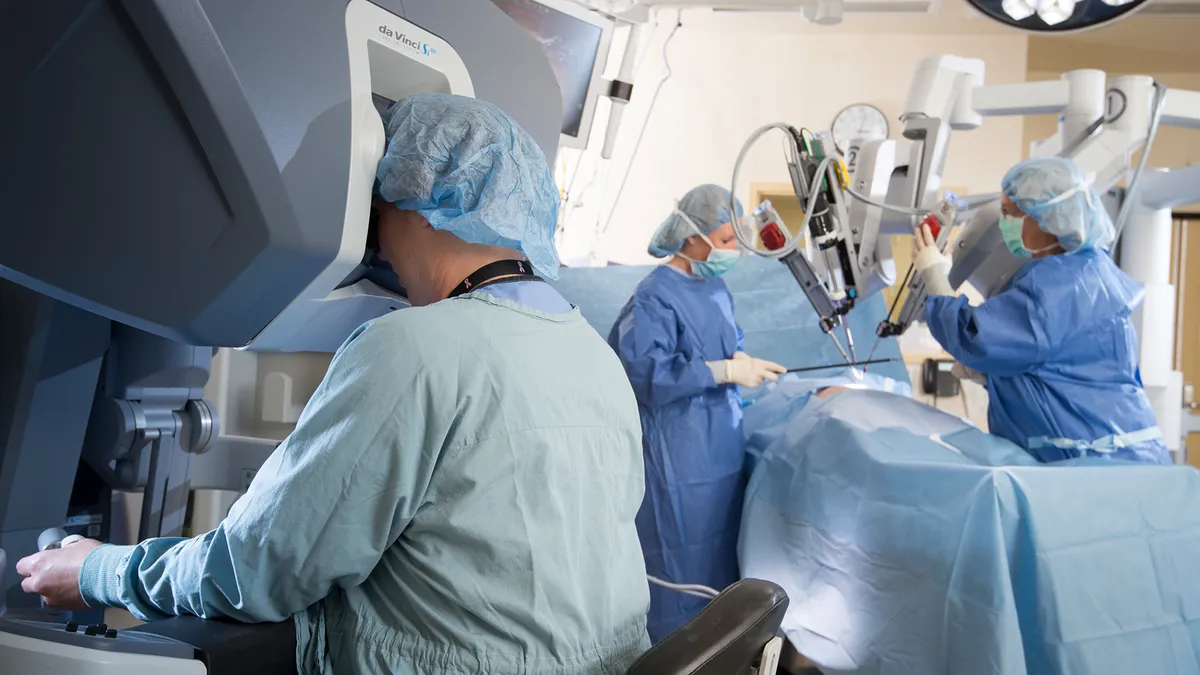Dive Brief:
-
Shares in Intuitive Surgical fell 7% Thursday after the robotic surgery leader posted first quarter results that fell short of analyst expectations.
-
Intuitive reported double-digit growth in procedures, shipments of surgical systems and sales but still saw its earnings per share come in below Wall Street's predictions, with stock remaining down more than 6% in early Monday trading.
-
The earnings miss reflected rising spending and lower upfront revenues as a result of a shift from client purchasing to leasing.
Dive Insight:
Intuitive has dominated robotic surgery for years but is now braced for a wave of competition. Well-financed startups and big companies like Johnson & Johnson, Medtronic and British manufacturer CMR Surgical are making plays for the field, driving Intuitive to try to build on its first-mover advantage before its rivals threaten its business.
Going into 2019, Intuitive warned spending would increase in the coming quarters as it sought to sew up the Chinese market and ramp up its informatics activities. That resulted in operating expenses rising by 32% in the first quarter.
Revenues also grew quickly, moving Intuitive's quarterly sales up toward $1 billion, but nonetheless fell just short of analyst expectations. Coupled to the rising spending, the slight revenue miss was enough to cause Intuitive's EPS to come in around a dime short of the $2.70 anticipated by analysts.
System sales underpinned the revenue miss but not because of a lack of demand. Intuitive shipped 235 da Vinci Surgical Systems in the first quarter, 27% more than in the corresponding period of last year. Yet, revenues from systems increased by just 6%.
The large gap between growth in system shipments and revenues reflects the changing nature of Intuitive's business. Whereas Intuitive once only sold expensive systems outright, it now offers some relatively-affordable leasing models alongside its premium equipment, reducing its customers' upfront costs. Intuitive also offers discounts for buyers of multiple systems. These changes combined in the first quarter to cause growth in revenues to fall short of shipments.
"The impact of leasing, trade-in and product mix are reflected in our systems revenue results for Q1. While these factors are aligned with our strategy and positive business levers, the revenue result was lower than historical norms relative to the number of systems placed," Intuitive CEO Gary Guthart said on a conference call with investors to discuss the first quarter results.
In the longer term, Intuitive thinks this will be a price worth paying, in part because the leases will provide it with a source of ongoing revenue. Intuitive has an eye on the competitive landscape, too, although it acknowledges there are pros and cons to leasing devices.
"You do run a risk with the some of the variations we're putting out there in financing that it may be easier for our customer to switch out. But we think that broadening the base now and getting the commitment of the surgeons and getting them trained so that we increase the barrier on that front is a better route to go," Guthart said.
Investors took a shorter term view, sending Intuitive stock down 7% in after-hours trading. Intuitive's ability to perform better in the coming quarters will depend on whether the same factors combine to constrain revenues. Guthart warned investors to expect "continued variation by quarter." The company is more certain about its spending growth outlook, which it narrowed to the top half of the prior range.
RBC Capital Markets' Brandon Henry lowered his price target for Intuitive's stock, noting the company's higher spending into market development and the increase in leasing and trade-ins.
"Despite this, we believe that ISRG's underlying procedure and system placement momentum continues and that the company is poised to remain the premium player in the surgical robotics market," Henry wrote in a note to investors.










